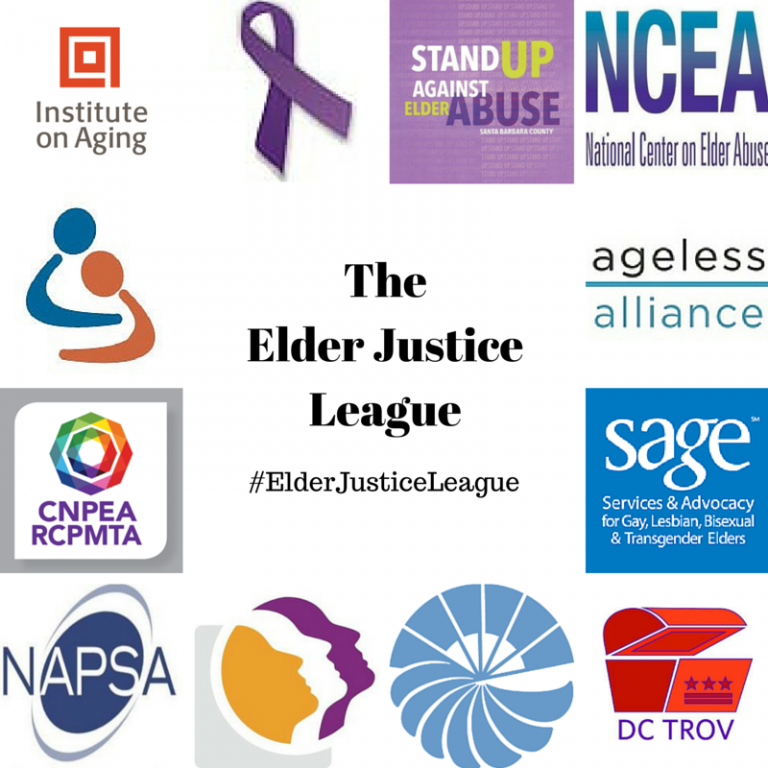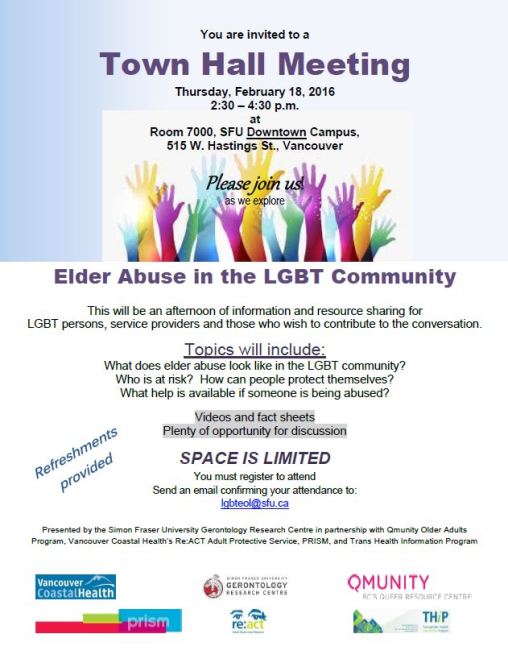Blog
- Details
By Talitha Guinn, N.Y.C. Elder Abuse Center Social Media Manager in collaboration with Ana Poblet-Kouttjie, MPH Project Coordinator, National Center on Elder Abuse, Keck School of Medicine of USC
Watch out world – the Elder Justice League is here! The League raises awareness of elder abuse across social media platforms and takes elder justice conversations mainstream. Convened in October 2015 by the National Center on Elder Abuse (NCEA), the League is comprised of elder justice advocates representing 11 organizations. Participating organizations have varying funding streams and missions, serve diverse populations, and share a wide breadth of expertise. League representatives are interdisciplinary and geographically diverse, hailing from many parts of the US and Canada. (Click here for a list of participating League organizations and representatives.)
The League’s methods are time-saving and effective. First, League members work together to generate ideas for elder justice-related social media messaging. Then, by coordinating the release of the messages, a multiplier effect is created, deepening the impact beyond what any one organization could accomplish alone. For example, during a recent meeting, we found that several organizations held a deep commitment to intergenerational approaches to end elder abuse. Since that meeting, members of the Elder Justice League have supported one another’s messaging around intergenerational elder justice causes where those messages align with each individual member’s core mission.
In addition to common messaging, the League offers many tangible benefits to member professionals and organizations. Current members report that their Facebook and Twitter posts are reaching larger audiences and attracting more followers. This group also offers a space to provide and receive feedback about campaign ideas, learn from each other’s efforts, obtain support and build new professional connections.
Another benefit is reduced isolation and opportunities for synergy. Elder justice advocates often work solo because their organizations have either a small staff or a staff with only a small percentage of time allocated specifically to elder justice initiatives. By coming together for a monthly web/teleconference and staying in touch via email, previously siloed advocates have become energized around their mutual work.
Meetings are coordinated by NCEA, but can be hosted and moderated by any of the members. During League conference calls, participants discuss current and upcoming social media campaigns, brainstorm new ideas and share social media handles and hashtags. All members are invited to contribute agenda items and anyone can participate in working groups that form to work on a particular issue or event. For example, several members are currently working on creating unified messaging for World Elder Abuse Awareness Day.
The League has created an ever-evolving and regularly updated database that includes member names, contact information and organizational social media account names. This database is a resource that can be used to locate other elder justice professionals online to share/like/comment on posts. Group members are active across multiple social media platforms and share content using popular hashtags such as #elderabuse and #elderjustice to increase the reach of individual posts and amplify online conversations.
If you work for an elder justice-focused nonprofit, government agency, organization, or coalition that has a social media account, you are invited to join the coalition. You don’t have to be a social media guru to share what you know and learn from others.
Email Ana Poblet-Kouttjie at if your organization would like to join The Elder Justice League. Thank you in advance for considering bringing your talent to the cause of taking elder justice mainstream – one click at a time.
- Details
By Margaret Easton
The relationship between frailty and elder abuse is receiving increasing attention in the research literature. In a previous blog, I reviewed research which suggested that normal age-related frailty leading to impairment in Activities of Daily Living (ADL’s) poses a significant risk factor for financial exploitation. The authors of that study concluded that “the need of some older adults for help and assistance in accomplishing everyday activities appears to elicit verbal abusiveness and economic exploitation, but not other forms of abuse” (Acierno et al., 2011). In this blog, I’d like to share the results of a research article published last month that strongly suggests that economic exploitation in late life leads to increased mortality (Burnett et al., 2016).
- Details
By Heather Campbell
The concept of institutional elder abuse is often associated with the mistreatment, exploitation and rights violations experienced by residents in care home settings. However, older adults in correctional facilities can also be victims of these institutional harms, and elders with dementia are particularly vulnerable if they become caught up in the criminal justice system.
Under the current system, a criminally accused individual with dementia faces a long, difficult and dangerous journey. From time to time, for example, we hear tragic reports of people with dementia languishing in prison or forensic hospitals. In early 2016, for example, a 53-year-old Yukon man with severe dementia had been in jail for six weeks awaiting a fitness to stand trial assessment. He was eventually found unfit, but remained in jail while he waited for a risk assessment to be conducted at a forensic hospital.
- Details
By Allison Jones

The forum, held at Simon Fraser University (SFU) downtown Vancouver on February 18, was well attended by LGBTQ seniors, health care providers, academics, students and other interested participants. It was the second in a series of five town hall meetings on elder abuse, hosted by Dr Gloria Gutman, presented in partnership by the Simon Fraser Gerontology Research Centre, and Quirk-e (the Queer elder riting kollective) and was held at .
Dr. Gutman gave opening remarks, introducing the audience to the reality of abuse in the LGBTQ communities and to the forms it takes, whether it be financial, physical, psychological or emotional. In some case, elder abuse presents itself as self-neglect, when an older person has no one to look after them, they may begin to neglect themselves to the point where it is considered a form of self-abuse.
Dr. Gutman received a grant from BC’s Ministry of Health to work with Quirk-e. Quirk-e members worked with Surrey Youth for a Change to write, act, direct and film three shorts (each no more than three minutes in length) with different scenarios depicting elder abuse. The Vancouver audience, which included staff from LGBTQ serving organizations, was enthusiastic. The films, although dealing with difficult topics, were refreshing in that they not only represented LGBTQ seniors, they were acted by LGBTQ seniors themselves. The shorts depicted abuse as complex and situational, with many different tensions intersecting, including family loyalty, internalized homophobia, control and gender conformity, and physical and psychological violence.
The town hall featured a number of Senior and LGBTQ senior-serving organizations including THiP, Vancouver Coastal Re-Act, SAIL (Seniors Abuse & Information Line), PRISM, QMUNITY, Alzheimer’s Society of BC, the Office of the Public Trustee and Dr.Gutman herself commenting on how LGBTQ elder abuse affects the LGBTQ seniors community. These town halls will happen or have already happened in Surrey, Prince George, Kelowna and on Vancouver Island. The group working on the grant has designed a number of LGBTQ elder abuse posters to raise the issue’s visibility and include information on how to report and document elder abuse when it occurs with LGBTQ seniors.
Please contact the Seniors Coordinator at QMUNITY or 604-684-8449 for more information.
- Details
Guest Blogger: Deborah Marshall
Quite often you turn on the news and you hear that the world is getting older and our population is aging. The media portrays the aging population as a negative thing, when in reality, older adults are often involved contributors, helping other older adults, working, volunteering and generally infusing money back into the economy. Getting older has many positives associated with it: having more time to volunteer, to travel, learn, visit and help family members. Getting older does not necessarily mean becoming unwell, and, for many Canadians, their best years will be in the ‘golden age’. Unfortunately, some seniors may not be as healthy in later years. Frailties can and do develop with the aging process, and these frailties, combined with putting too much trust in the wrong person, may lead to elders becoming vulnerable to abuse.
Page 45 of 55

















